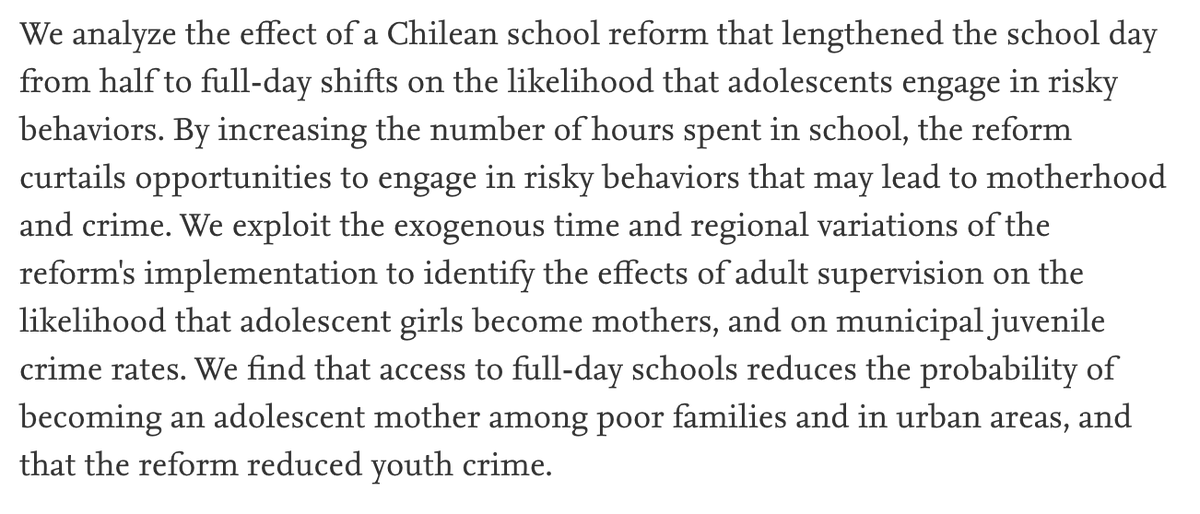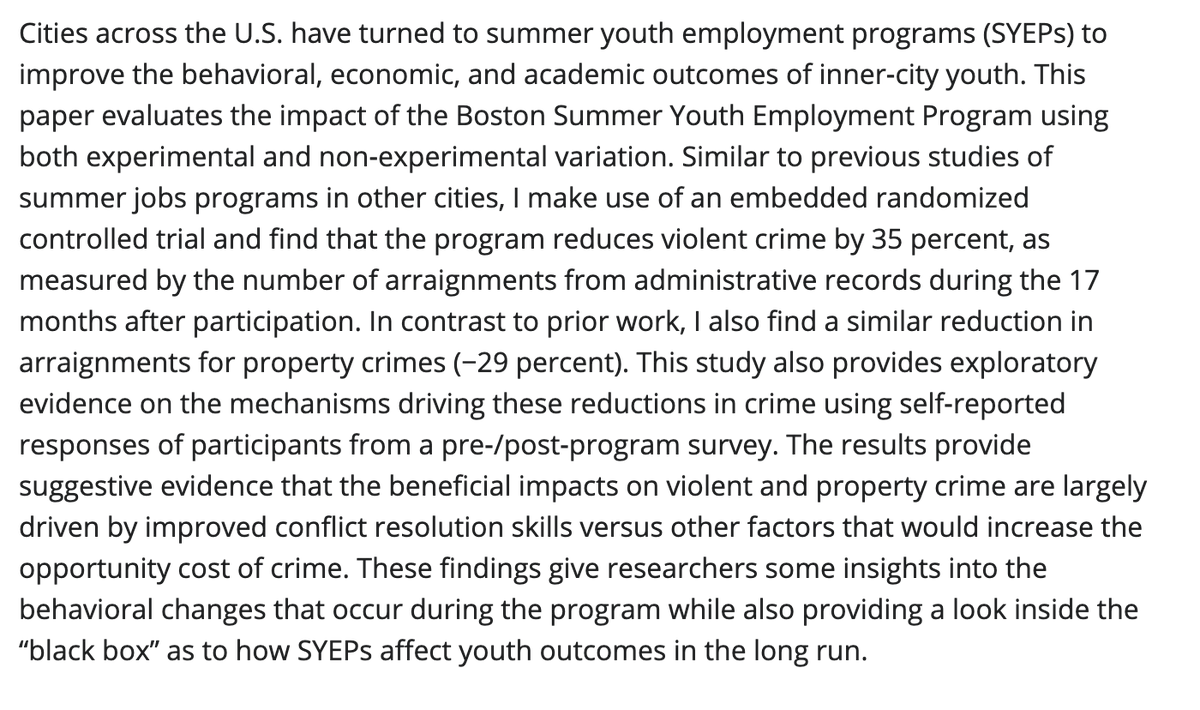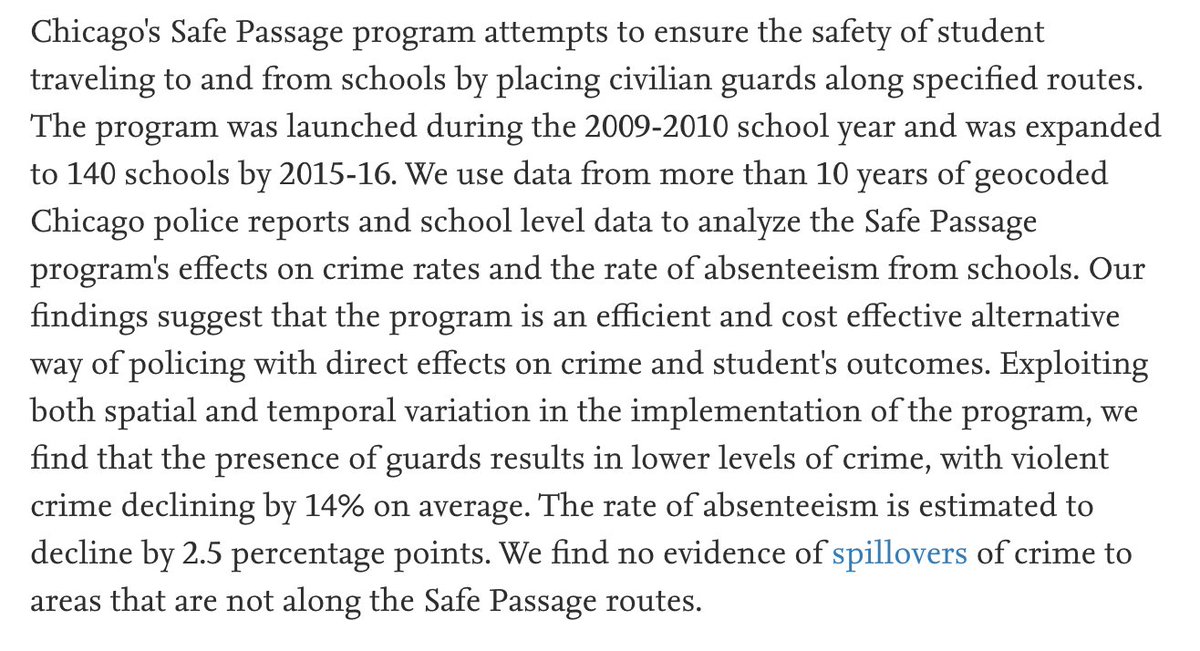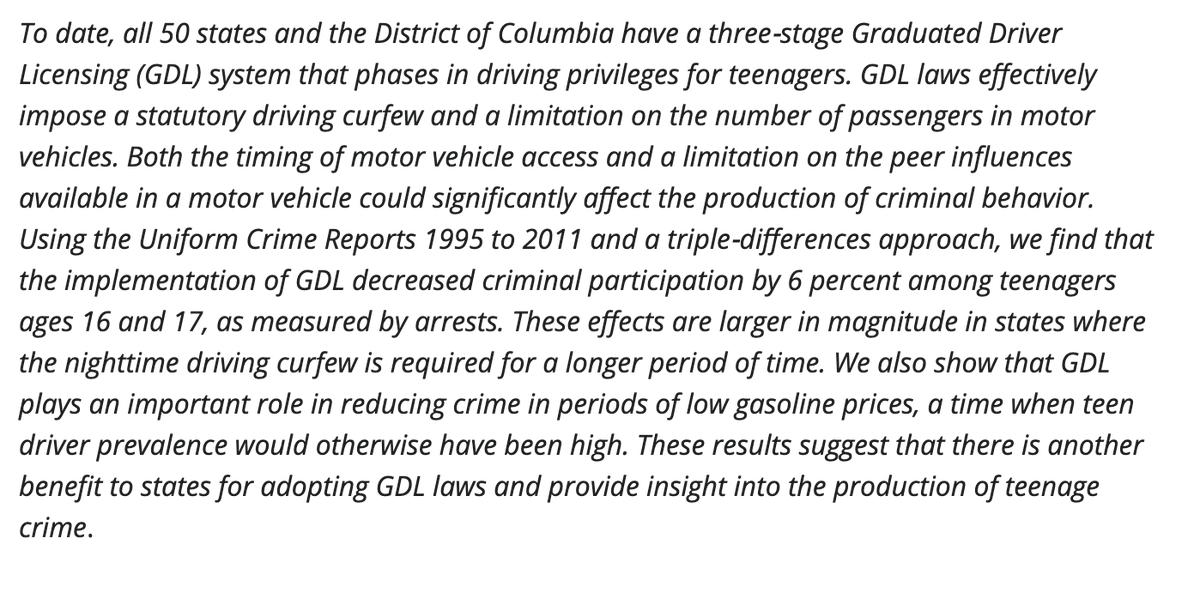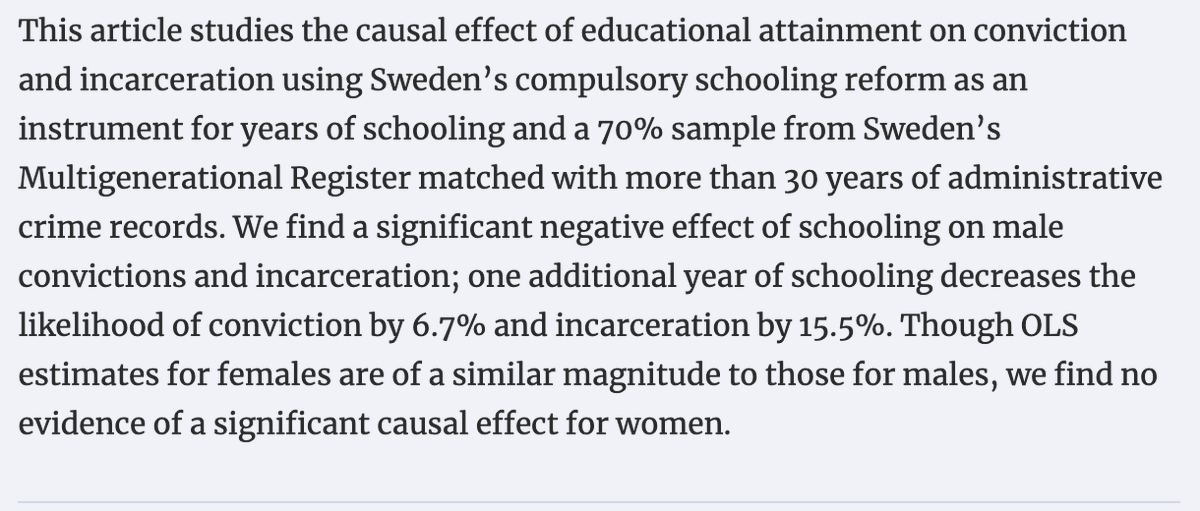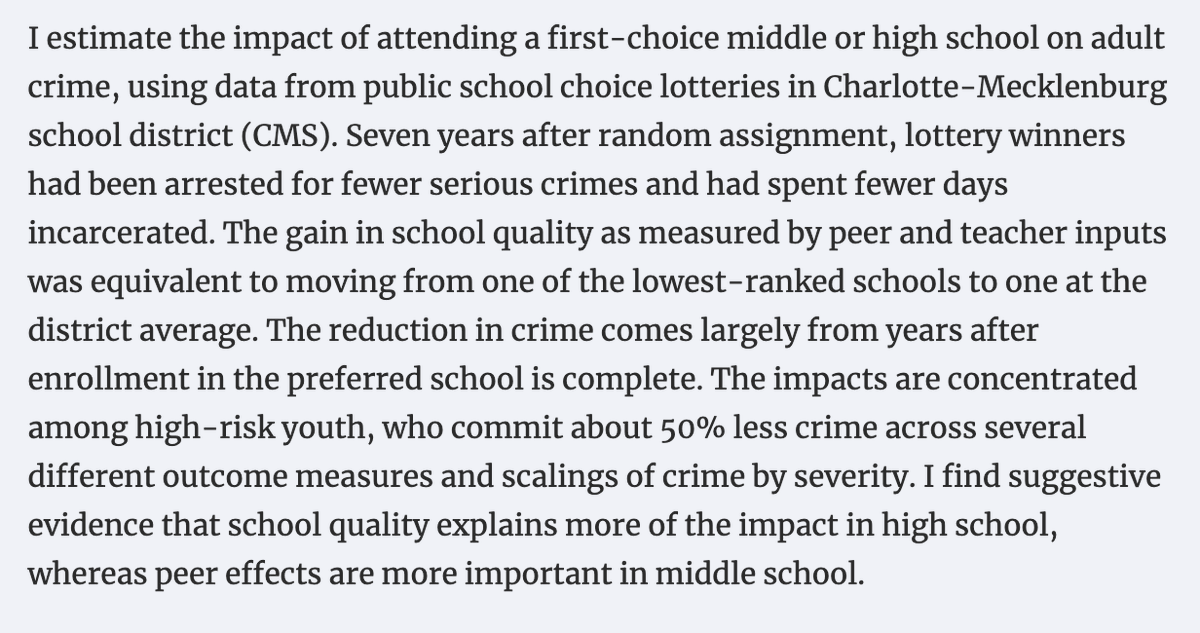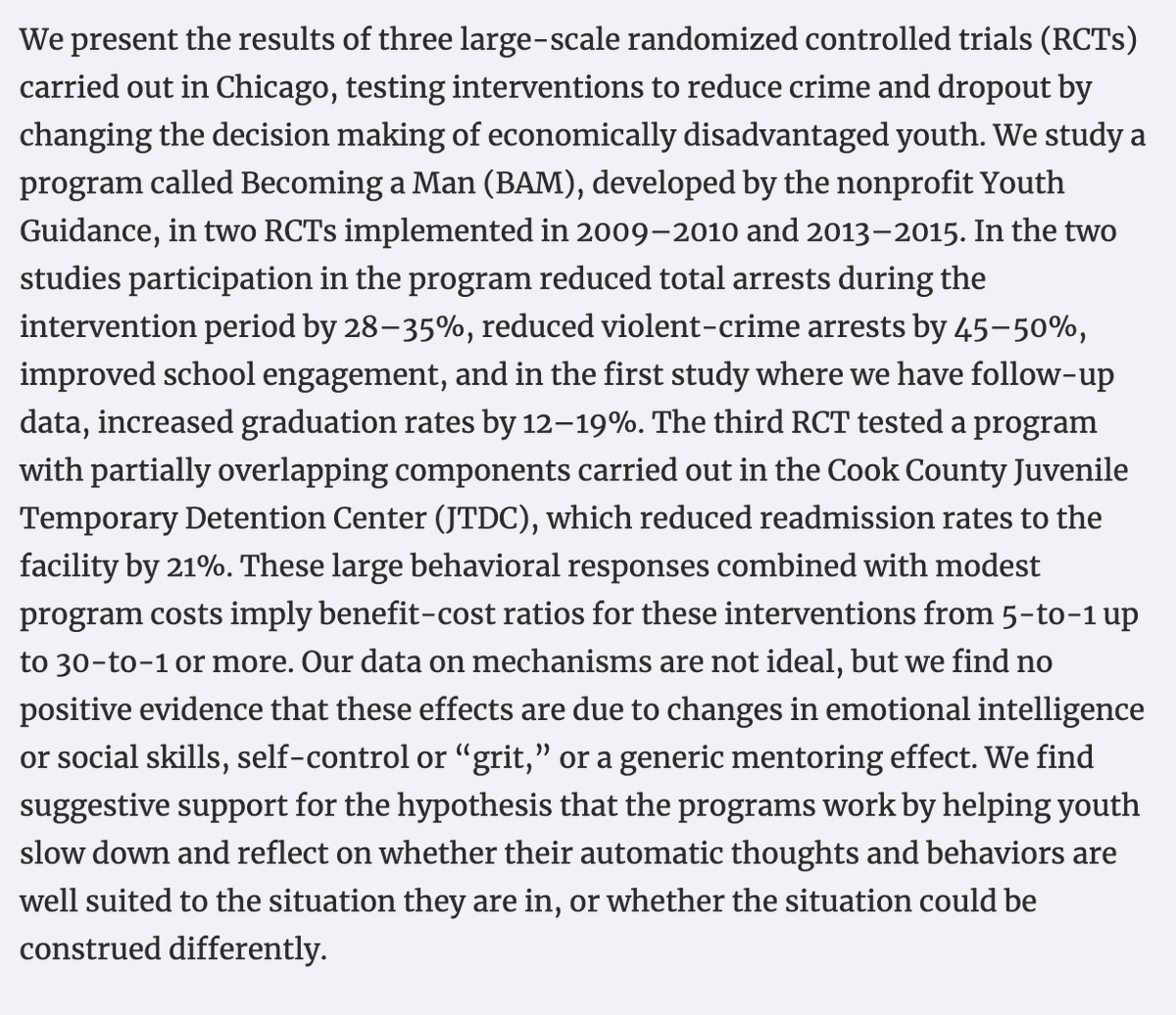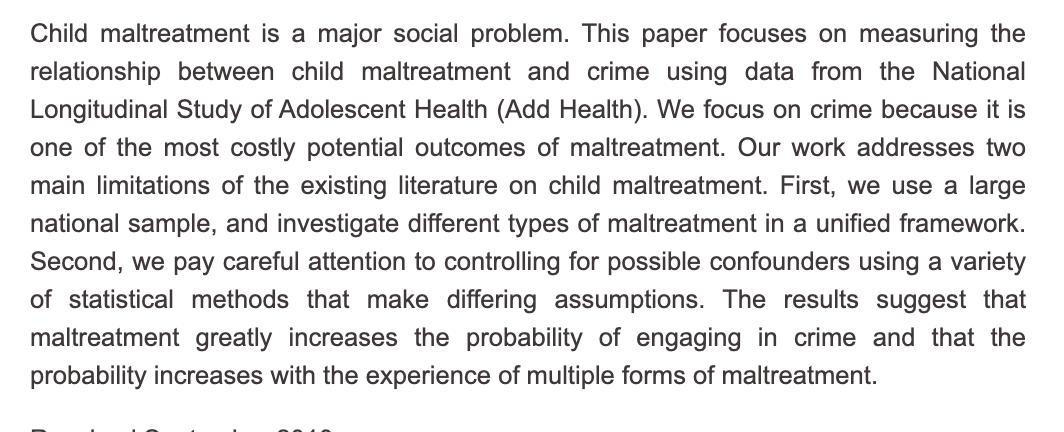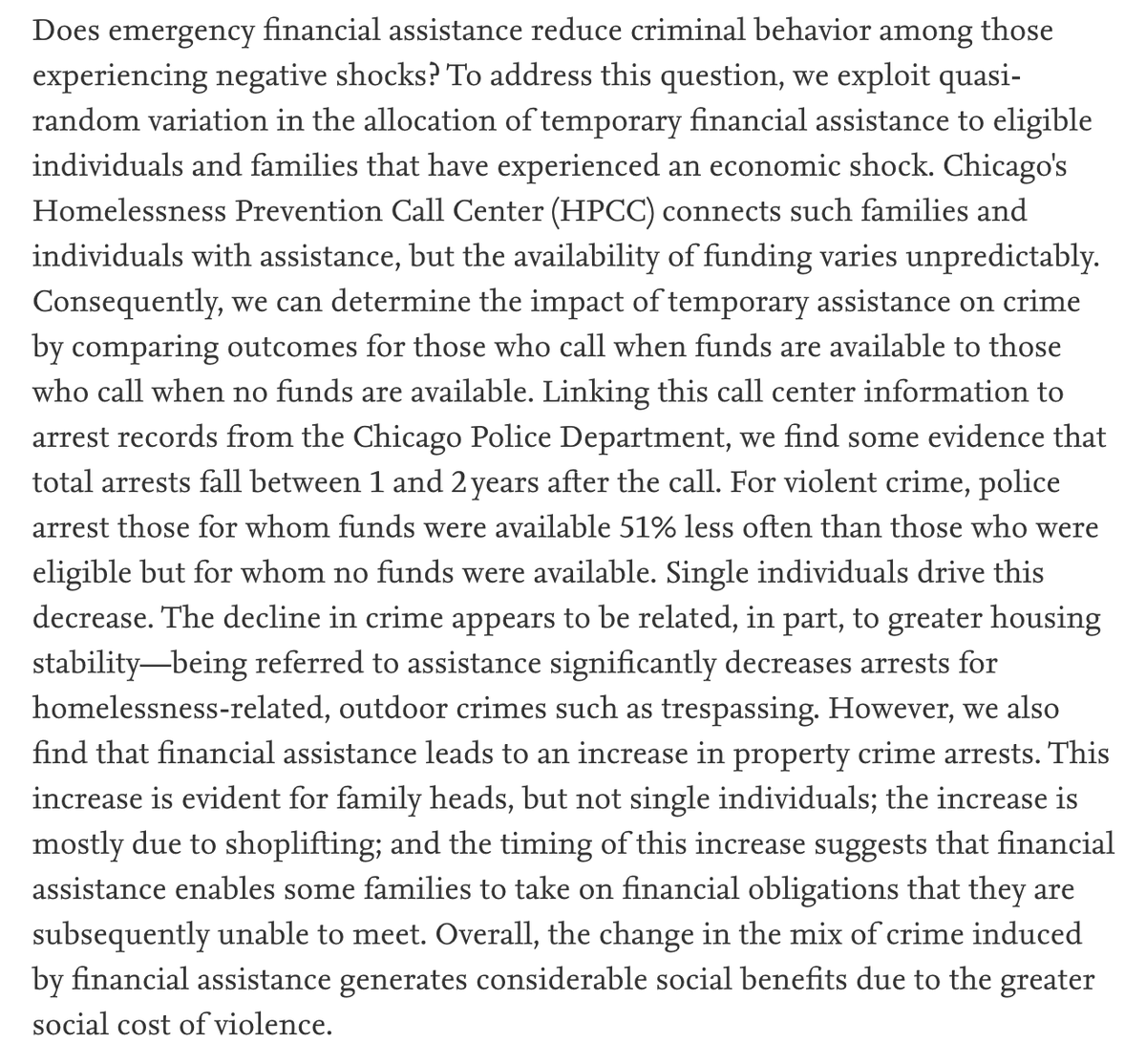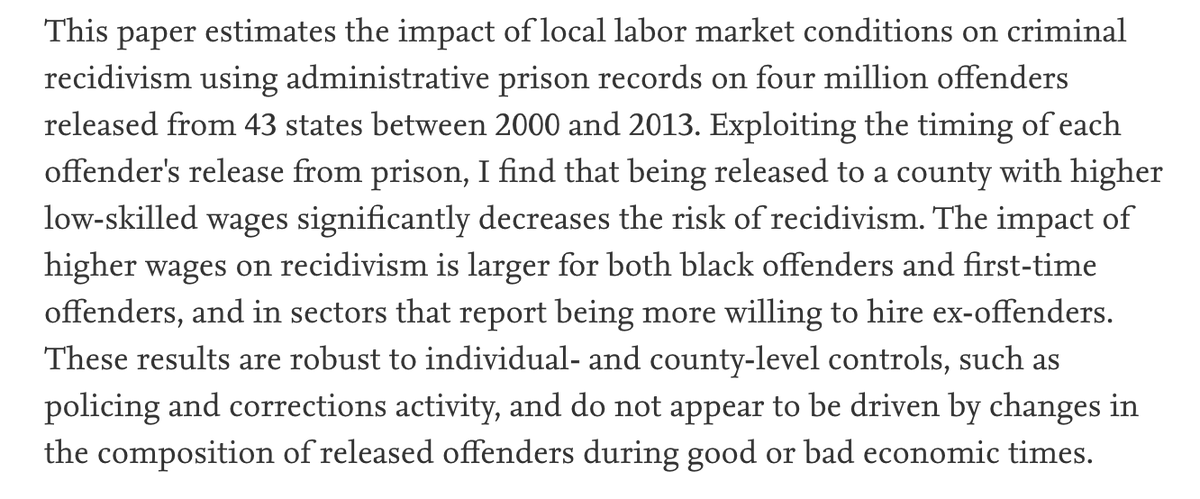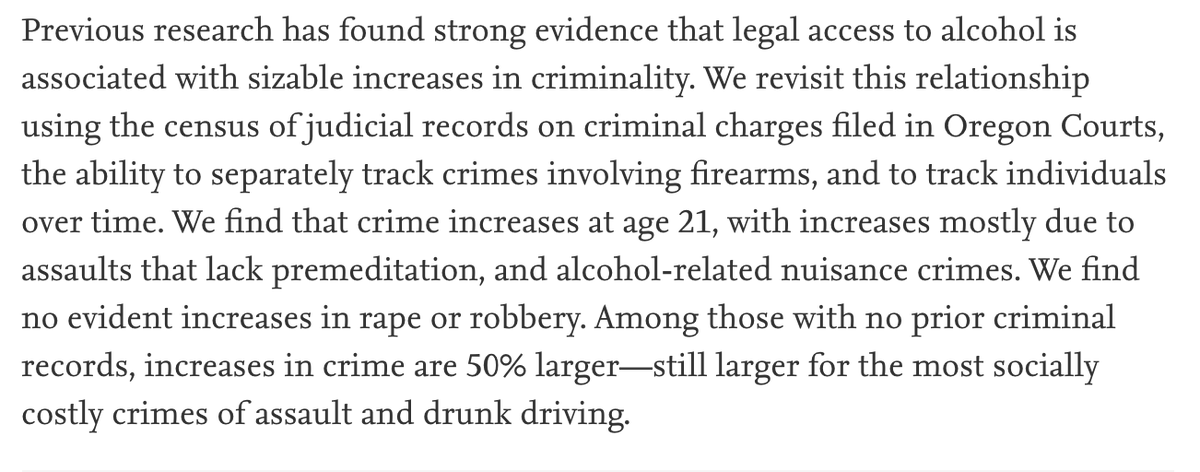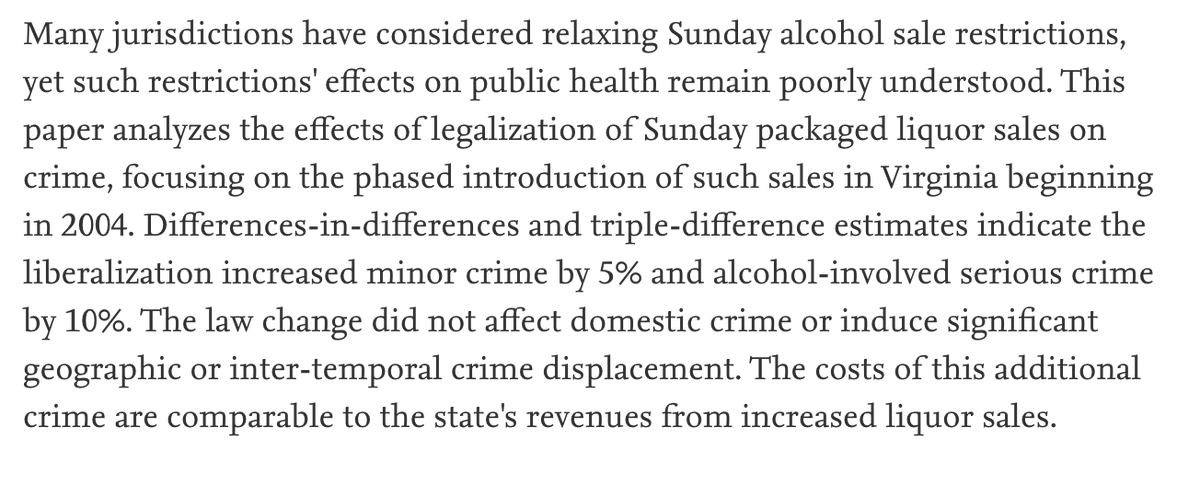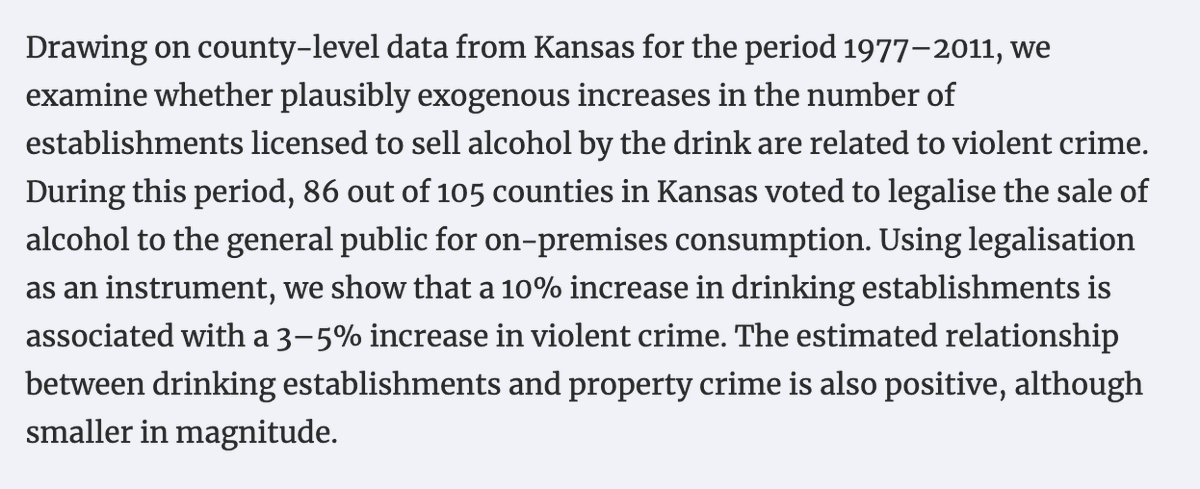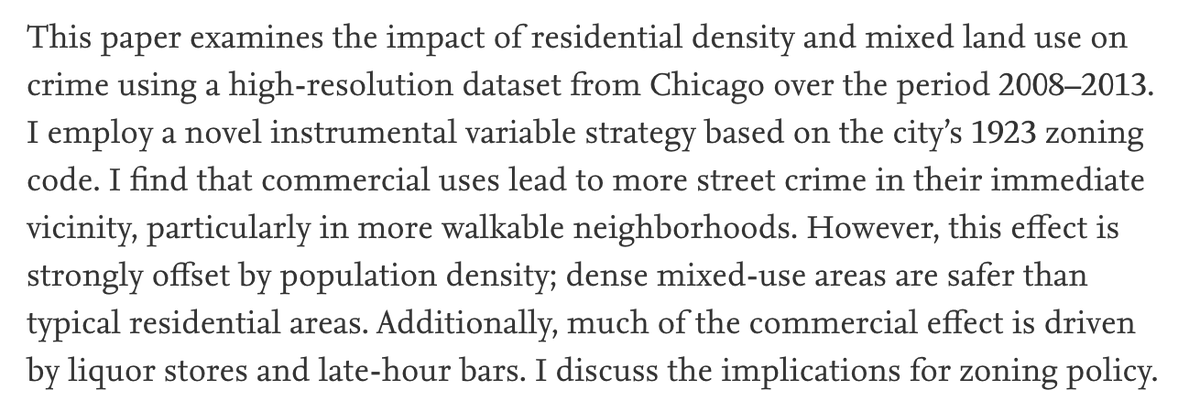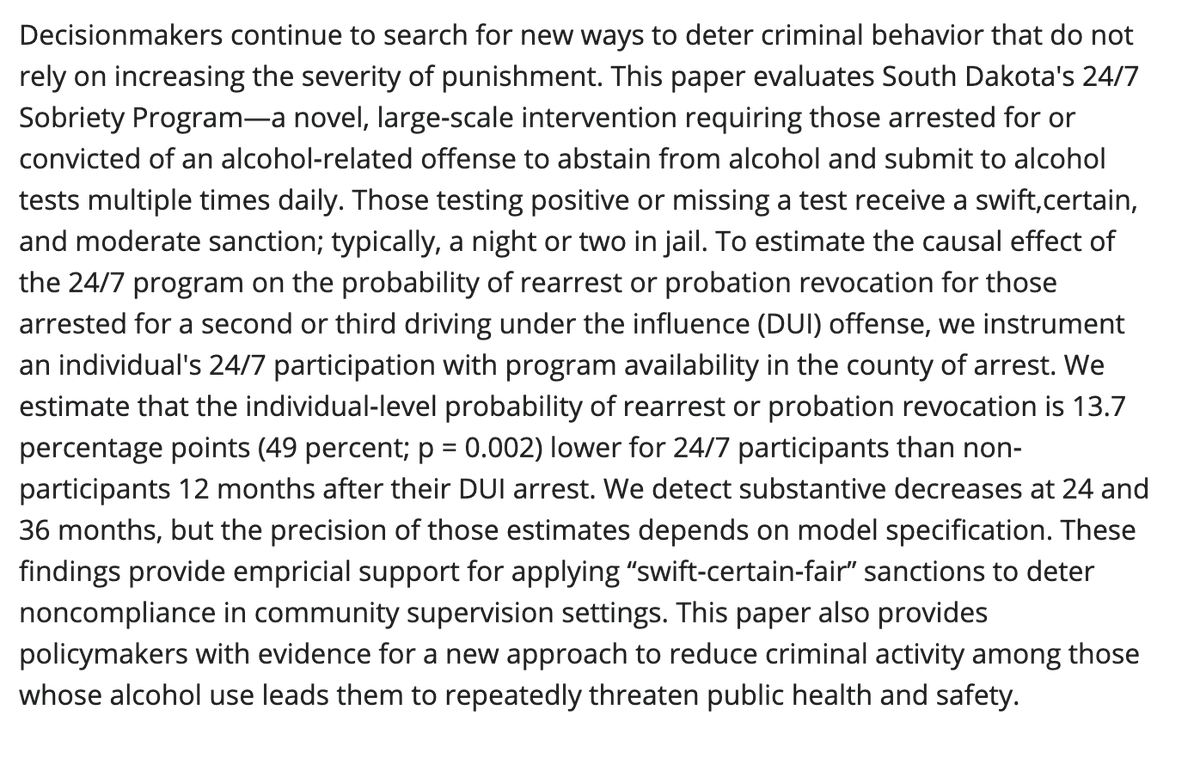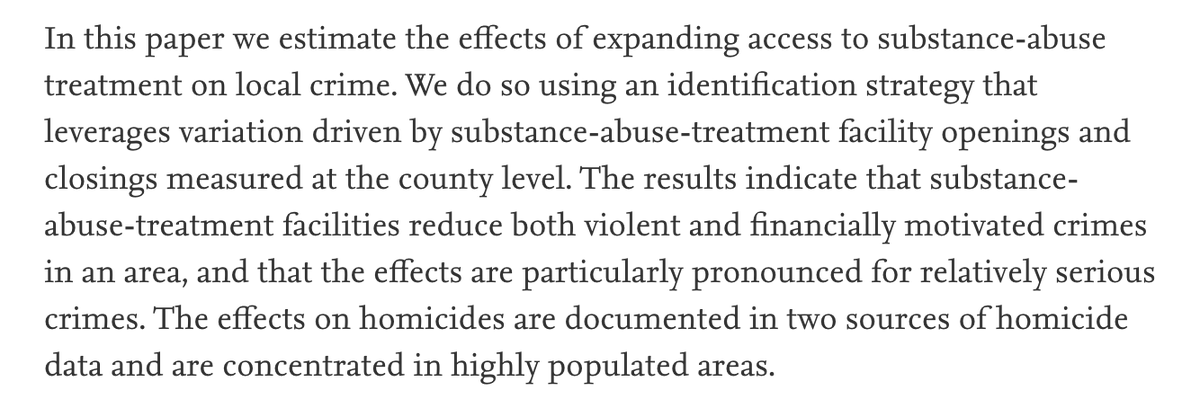Recently there's been lots of interest in alternatives to law enforcement. Many have also expressed concern about recent increases in violent crime.
So: what non-law enforcement policies/programs have been shown specifically to reduce *violent crime*?
A thread:
So: what non-law enforcement policies/programs have been shown specifically to reduce *violent crime*?
A thread:
First, if you give kids a structured and supervised way to spend their time, you reduce violent crime.
E.g., raising the school dropout age from 16/17 to 18 reduces violent crime arrests for 16-18 yr olds:
https://www.mitpressjournals.org/doi/10.1162/REST_a_00360
E.g., raising the school dropout age from 16/17 to 18 reduces violent crime arrests for 16-18 yr olds:
https://www.mitpressjournals.org/doi/10.1162/REST_a_00360
E.g., lengthening the school day reduces violent juvenile crime:
https://www.sciencedirect.com/science/article/abs/pii/S0047272710001210?via%3Dihub
https://www.sciencedirect.com/science/article/abs/pii/S0047272710001210?via%3Dihub
E.g., giving kids summer jobs, which reduce violent youth crime not only during the period of the summer job, but also afterwards @SasserModestino:
https://onlinelibrary.wiley.com/doi/abs/10.1002/pam.22138
https://onlinelibrary.wiley.com/doi/abs/10.1002/pam.22138
E.g. more evidence that summer jobs reduce youth violent crime:
https://www.mitpressjournals.org/doi/abs/10.1162/rest_a_00850
https://www.mitpressjournals.org/doi/abs/10.1162/rest_a_00850
Relatedly, providing for more (civilian) adult supervision for kids on their way to/from school also reduces violent crime @ruchi_econ @IKISarmiento:
https://www.sciencedirect.com/science/article/abs/pii/S0094119019300014?via%3Dihub
https://www.sciencedirect.com/science/article/abs/pii/S0094119019300014?via%3Dihub
Directly restricting kids' ability to engage in certain obvious risky behaviors, like driving at night, reduces violent crime @monicajdeza :
https://onlinelibrary.wiley.com/doi/abs/10.1002/pam.21893
https://onlinelibrary.wiley.com/doi/abs/10.1002/pam.21893
Not only giving kids more structure/supervision can reduce violent crimes, but also investing in their human/social capital reduces violent crime.
E.g., more years of school reduce later violent crime:
https://academic.oup.com/ej/article/125/587/1290/5077850
E.g., more years of school reduce later violent crime:
https://academic.oup.com/ej/article/125/587/1290/5077850
E.g, improving the quality of kids' schools reduces later violent crime @ProfDavidDeming:
https://academic.oup.com/ej/article/125/587/1290/5077850
https://academic.oup.com/ej/article/125/587/1290/5077850
E.g., supplementing school with targeted programs to increase kids' social/emotional skills can reduce later violent crime @m_sendhil @haroldpollack:
https://academic.oup.com/ej/article/125/587/1290/5077850
https://academic.oup.com/ej/article/125/587/1290/5077850
Improving the health and safety of kids in their own homes also reduces later violent crime.
E.g. targeted intervention for lead poisoning remediation reduces later violent crime @KSchnepel @BillingsEcon
https://www.aeaweb.org/articles?id=10.1257/app.20160056
E.g. targeted intervention for lead poisoning remediation reduces later violent crime @KSchnepel @BillingsEcon
https://www.aeaweb.org/articles?id=10.1257/app.20160056
E.g., reducing child maltreatment reduces later violent crime @Erdal_Tekin_ :
http://jhr.uwpress.org/content/47/2/509.abstract
http://jhr.uwpress.org/content/47/2/509.abstract
E.g., mitigating income shocks to kids' families post-divorce can reduce later violent crime:
https://www.journals.uchicago.edu/doi/abs/10.1086/662137
https://www.journals.uchicago.edu/doi/abs/10.1086/662137
Mitigating short-term family economic insecurity more generally can reduce violent crime, even in the near term:
https://www.sciencedirect.com/science/article/abs/pii/S004727271830210X?via%3Dihub
https://www.sciencedirect.com/science/article/abs/pii/S004727271830210X?via%3Dihub
Relatedly, relief spending during the Great Depression reduced violent crime:
https://www.journals.uchicago.edu/doi/10.1086/655778
https://www.journals.uchicago.edu/doi/10.1086/655778
Mitigating the negative economic consequences of leaving school during a severe recession can reduce violent crime @AnnaBindler @s_machin_:
https://www.mitpressjournals.org/doi/abs/10.1162/REST_a_00698
https://www.mitpressjournals.org/doi/abs/10.1162/REST_a_00698
Likewise, mitigating the negative economic consequences of leaving prison in a local context of lower wages can reduce violent crime:
https://www.sciencedirect.com/science/article/abs/pii/S0047272716302067?via%3Dihub
https://www.sciencedirect.com/science/article/abs/pii/S0047272716302067?via%3Dihub
Providing short-term financial support can reduce domestic violence victimization:
https://www.aeaweb.org/articles?id=10.1257/pol.5.1.179
https://www.aeaweb.org/articles?id=10.1257/pol.5.1.179
Another study showing short-term economic support reduces domestic violence victimization @a_peterman:
https://www.aeaweb.org/articles?id=10.1257/app.20150048
https://www.aeaweb.org/articles?id=10.1257/app.20150048
Short-term financial assistance may be more effective at reducing violent crime when coupled with support for social/emotional capital development @cblatts :
https://www.aeaweb.org/articles?id=10.1257/aer.20150503
https://www.aeaweb.org/articles?id=10.1257/aer.20150503
Likewise for reducing domestic violence victimization:
https://www.mitpressjournals.org/doi/full/10.1162/rest_a_00791
https://www.mitpressjournals.org/doi/full/10.1162/rest_a_00791
Another series of interventions address substance abuse. Reducing access to alcohol can reduce violent crime.
E.g., age restrictions on access to alcohol reduces violent crime:
https://www.mitpressjournals.org/doi/10.1162/REST_a_00489
E.g., age restrictions on access to alcohol reduces violent crime:
https://www.mitpressjournals.org/doi/10.1162/REST_a_00489
More evidence that age restrictions on access to alcohol reduce violent crime @benconomics @GlenWaddell:
https://www.sciencedirect.com/science/article/abs/pii/S0167629617307191
https://www.sciencedirect.com/science/article/abs/pii/S0167629617307191
Restrictions on where and when alcohol can be sold reduce violent crime @cirobiderman @jmpmello :
https://academic.oup.com/ej/article-abstract/120/543/157/5089594
https://academic.oup.com/ej/article-abstract/120/543/157/5089594
More evidence that restricting where/when alcohol can be sold reduces violent crime:
https://www.sciencedirect.com/science/article/abs/pii/S0047272711001435?via%3Dihub
https://www.sciencedirect.com/science/article/abs/pii/S0047272711001435?via%3Dihub
More evidence that alcohol sale restrictions reduce violent crime:
https://academic.oup.com/ej/article-abstract/128/611/1333/5088762
https://academic.oup.com/ej/article-abstract/128/611/1333/5088762
Reducing liquor store/bar concentration in urban neighborhoods not also characterized by residential density reduces violent crime:
https://www.sciencedirect.com/science/article/abs/pii/S009411901730044X
https://www.sciencedirect.com/science/article/abs/pii/S009411901730044X
At the individual level, alcohol sobriety monitoring programs can reduce violent crime @gregmidgette @BeauKilmer :
https://onlinelibrary.wiley.com/doi/abs/10.1002/pam.22217
https://onlinelibrary.wiley.com/doi/abs/10.1002/pam.22217
Relatedly, increasing access to substance abuse treatment can reduce violent crime @jasonmlindo:
https://www.sciencedirect.com/science/article/abs/pii/S009411901830007X
https://www.sciencedirect.com/science/article/abs/pii/S009411901830007X
\\pause

 Read on Twitter
Read on Twitter
